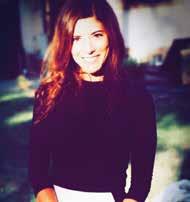
4 minute read
Be the Author of Your Own Life
October 2024

The Ruach Community
Even as a young child, I innately understood why the High Holidays were called The Days of Awe. The conservative shul that I grew up attending in Minneapolis, Minnesota, was absolutely packed on yontif! That in and of itself, marked Rosh HaShanah and Yom Kippur as days that made me take notice. But it was especially during the U’Netaneh Tokef prayer:
“On Rosh HaShanah, it is written, and on the Fast of the Day of Atonement, it is sealed!
How many will pass on, and how many will be born;
Who will live and who will die;
Who will live a long life and who will come to an untimely end...”
These words made me start to pay attention to the service. When nearly one thousand congregants would rise all together as the ark was opened to proclaim, “Let us ascribe Holiness to this day.” I couldn’t help but turn my attention away from braiding the tzit-tzit on my father’s tallis, as my ears perked up at the beginning verse: “Who shall live and who shall die?”
Yes, it frightened me a little bit, but it also made me pay attention. I noticed how serious the congregation became, as if this prayer held even more power than when the Torah was brought out. As I grew older, and studied in Rabbinic school, I had the opportunity to look more closely at the meaning of this prayer.
Interestingly, it’s not the instilling fear part that has captured my attention, but rather the final verse of the prayer I have begun to focus on of late because, in the past few months, my husband and I have been to four funerals of friends, all in their 50s to early 60s. It has made a huge impact on us, losing those near and dear to us. The fact that the High Holidays are upon us has caused me to look more closely at the end of the U’Netaneh Tokef prayer:
“But teshuvah - repentance, tefillah - prayer, and tzedakahgiving to those in need—change the evil decree.”
As Rabbi Aaron Weininger wrote in his Rosh HaShanah sermon a few years ago:
“If we do those things, then order will be restored. If we practice repentance, commit to prayer, and give to those in need—then we avoid being written into the Book of Death.
Who can allow such a theology to wreak havoc in our sanctuaries? Our experience proves time and again that life is more complicated than being promised that three things change the decree from death to life. That good people suffer and do not get written into the Book of Life. That bad people flourish and are inscribed nonetheless. I cannot believe in a God who sits above judging us as we pass by, inscribing our destiny, locking in our fate as the New Year begins.”
I wholly concur with Rabbi Weininger’s criticism of this prayer.
I have publicly gone up against speakers who proclaim that those who are ill are, in some way, themselves, responsible for their diseases, and I have been kicked out of some lectures and wellness programs for daring to question this “holistic” narishkeit.
That is why as much as I revere this ancient prayer, this year, I strive to find a new interpretation to the last verse. I studied many rabbinic interpretations in preparation for this article. Much of these scholarly analyses are too long and complicated to add here. While doing my research, I had my own inspiration of what the final verse means:
“But teshuvah - repentance, tefillah - prayer, and tzedakahgiving to those in need—change the evil decree.”
None of us may know or have any control about when or how we may pass away. But(!), we do have some control over how we live our lives, how we respond to what life throws at us. Perhaps the final verse about repentance, prayer, and giving to those in need, simply means that these are the three important actions we can fill our living days with. This New Year, may you fill your days with these three actions. It may not keep you from being inscribed in The Book of Life, but I can assure you it will improve your life.
As one of my mentors, Dr. Rabbi Lawrence Hoffman writes:
“What we have here is an exploration not just of life vs. death, but of quality of life - who will be calm, and who will be tormented? Who will be exalted, and who will be humbled? Who will be rich, and who will be poor?”
I would add: How many mitzvot will you perform? How many people in need will you help? These are the questions we enter into the new year with. Shanah tova!










